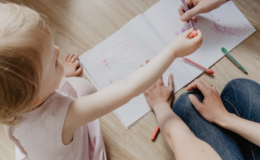Attachment theory focuses on intimate relationships and how they influence us, especially in those first years between an infant and a mother. If the relationship is secure then the infant knows that he is valuable and that the mother is reliable and consistent in her love. From this security infants begin to grow and learn about themselves, others, and the world they live in. It is a foundational component to healthy emotional development.
When a child is confident in this love, they begin to feel confident to explore their surroundings. You see this when babies begin to crawl. They often venture away from their mother to explore, but will still pause and check to make sure mother is there and they’re safe. The care-provider, in a securely attached relationship, provides what is known in attachment theory as a secure base from which that child can explore the world. If they become scared or hurt, they seek reconnection with their secure base in order to receive comfort and learn from their experience.
We have also learned that attachment does not stop at infancy, but weaves through our entire life. Our secure (or insecure) attachment can influence all our relationships and our perspective of others as well as ourselves. If an adult does not believe that their spouse’s care is consistent and reliable, this can dramatically impact a marriage.
In my work with teens I find that many parents feel at a loss with trying to connect and nurture a relationship with their teenage son or daughter. Often teens (even securely attached teenagers) separate from their parents as they try and figure out who they are apart from mom and dad. This is normal developmental for adolescents. However, it still feels disheartening to many parents, and when you combine that with insecure attachment, risky behavior, a defiant attitude, and/or friends that you don’t know well, parental anxiety can run high.
My encouragement to parents of teens is your relationship with them still deeply matters to them (even if they act like it doesn’t)! We all need a secure base in which to explore the world from, and this is still true with teenagers. Your son or daughter need a place to return to when they become scared or hurt, and you are one of the most secure and consistent people in their lives. Therefore, we as parents, have to manage our own anxiety and insecurities, and continue to be a place of stability, consistency, and love.
We cannot force our children to be in relationship with us, but we can provide a constant, steady, loving presence for them. The confidence that there is a secure base to turn to, in order to receive comfort and learn from their experiences, remains a foundational part of development; for infants, children, teens, and adults. Your ability to be a secure base for you teenager is not dependent on her response back to you. You can be the secure base they need.
– Jason Hodgson, LPCC






Leave a Comment